The 7 Habits of Highly Effective People – Book Summary
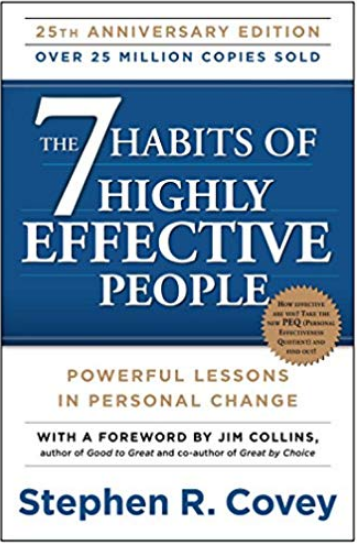
Short Summary
Develop the 7 critical habits to break through in life in 3 main phases:
Phase 1 - Private victory:
- Habit 1 - Be Proactive. Take full responsibility, focus on what you control
- Habit 2 - Begin With The End In Mind. Plan your life backwards
- Habit 3 - Put First Thing First. Prioritize ruthlessly, focus on what matters
Phase 2 - Public victory:
- Habit 4 - Think Win - Win. Look for ways to make it mutually beneficial
- Habit 5 - Seek First To Understand Then To Be Understood. Learn to listen
- Habit 6 - Synergize. Combine multiple inputs creatively to gain more
Phase 3 - Ultimate victory:
- Habit 7 - Sharpen The Saw. Protect the most important asset - you.
Full Review
According to Covey if you want to win big in life you have to master the 7 habits of highly effective people in the right order. To make it easier to understand, remember, and implement he splits them into the 3 main phases:
- Habits 1-3 lead to achieving private victory and independence
- Habits 4-6 make you win publicly and become a highly recognized leader
- Habit 7 brings the ultimate victory into your life by making it balanced
The below infographic illustrates how this 3-phase, 7-step process works:

Habit 1 - Be Proactive
The first habit is becoming proactive: understanding that you are the architect of your own life regardless of your circumstances and conditioning.
- Reactive people are victims, they are not in control by choice
- Proactive people are in charge, they are in control by choice
Reactive People | Proactive People |
|---|---|
|
|
When we become proactive we move from the state of being dependent to being fully independent. No excuses, no blame, no dependency on others. This move lays out a solid foundation for the remaining 6 habits.
1.1 Grow Your Influence
Cover says that our results in life are determined by the Circle Of Influence:
- the ability to focus on what we can control, and
- not being upset with what's outside of our control
1.1.1 Reactive People Shrink Their Circle Of Influence
People who don't take full responsibility for their life tend to focus on what the don't control. They get angry with the government, competitors, boss, colleagues, parents, children, and weather to name a few.
As a result their circle of influence shrinks every day: they get more and more dependent on someone or something else to make them happy.
And if this doesn't happen? Another bad day!
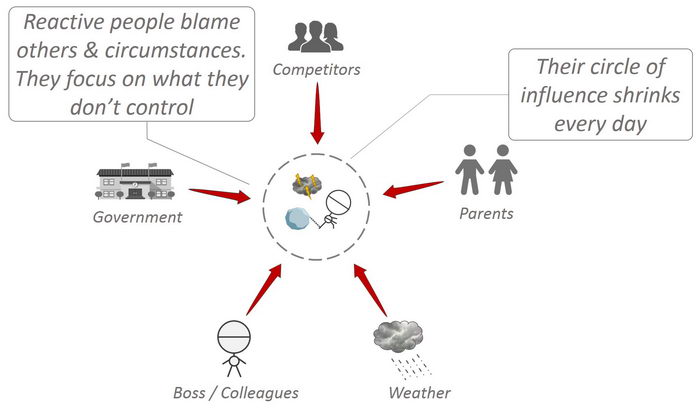
1.1.2 Proactive People Expand Their Circle Of Influence
Those who understand and accept the truth of being totally responsible for their own results in life focus only on what they can control. They don't get irritated when things don't go their way. They do everything they can to overcome obstacles while taking full responsibility for their lives.
As a result their circle of influence expands every day: they get more and more independent. Their results compound and they only get happier.
And if things don't go their way ? Too good ! Another opportunity to improve and grow !
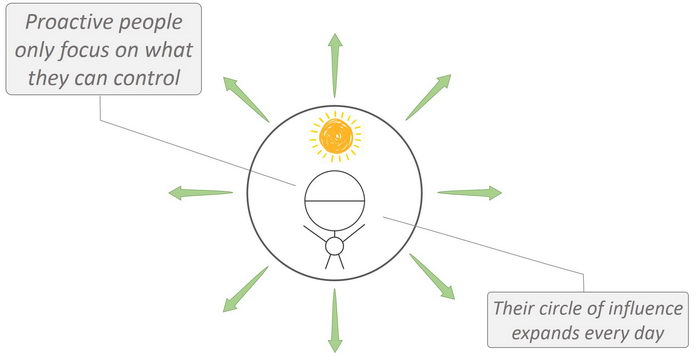
Here is how reactive and proactive people compare:
Reactive People | Proactive People |
|---|---|
|
|
1.2 Respond Instead Of Reacting
For Covey being proactive means understanding the law of stimulus and response.
Viktor Farnkl once said: "Between stimulus and response there is a space. In that space is our power to choose our response. In our response lies our growth and our freedom."
Here is how the law works day in - day out like a clock:
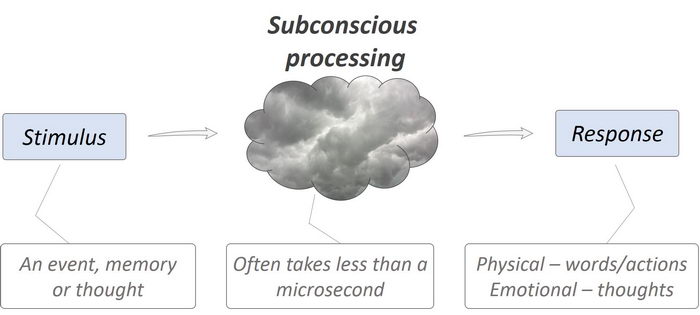
Want a real life example? This one happens thousands of times every single day in every single city of the world. And it doesn't matter if you can't drive. Being a passenger is good enough to understand and relate.
When a careless driver cuts someone on the road the "attacked" person has a choice on how to respond.
- He can go crazy with his horn and use all sort of coarse language thus ruining the next few hours or even the whole day, or
- He can choose not to respond in a negative manner and being grateful there was no accident and that everyone is still safe
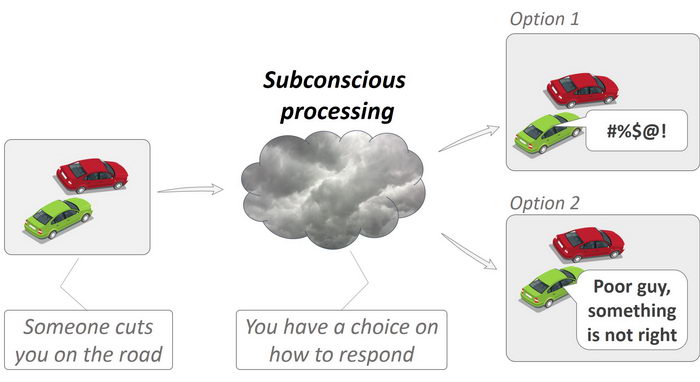
When something "negative" happens, don't react, don't let your subconscious habits decide what to do, just pause and think about it for a second. Is it in your control? If not, just let it go. Try as long as you can until you can intercept the automatic reaction and stop it with your own thoughts. Keep doing that for as long as needed until it becomes a habit.
Habit 2 - Begin With The End In Mind
The 2-d habit is all about inversion of your life. If you want to succeed badly avoid following the crowd: the majority of people live lives of quiet desperation and don't know the answer. Follow those who trailblazed the way of breaking through in life.
And that's why Covey says: "begin with the end in mind". Reverse engineer your life from the very end all the way to the now. Those who don't know what their destination is will never arrive. They will take it day by day until the life is over. By then it will be too late.
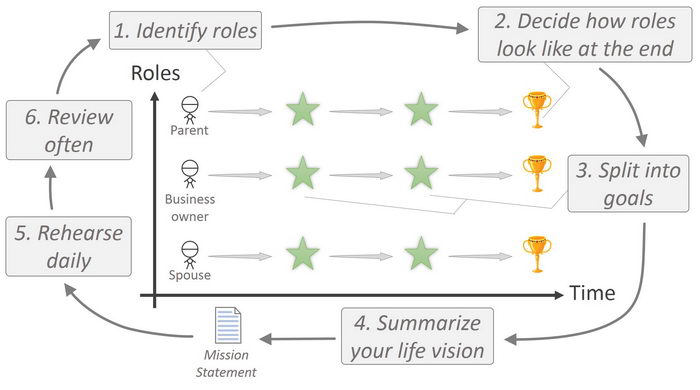
As indicated in the above diagram Covey suggests introducing the following process:
- Identify your most important roles in life (no more than 7 to prevent being overwhelmed):
- husband / wife
- child
- father
- team member
- business owner
- and so on - Begin with the end in mind by imagining your own funeral. Yes, it's super creepy, but stay with Stephen here, it's worth it. What would you like your family members, colleagues, clients, and friends to say about you for each of the roles you have just identified? About your character? About your contributions and achievements? About the difference you made in their lives? How would each role look like at the end?
Take a few minutes, use your imagination, and write down a few high level statements for each role. It's your own definition of success. That's how you truly begin with the end in mind ! - Set goals for each role. Take the outcomes of the previous step and come up with 4 to 5 high level goals for each role from your list. To help with this step ask yourself the following questions:
- what's important in each role ?
- what specific results do you want to achieve for each one ?
- what's the process ?
Essentially, you have just created a high-level roadmap for your entire live - Summarize your life vision by coming up with a mission statement. Blend all the components from the previous steps into a single statement of direction in your life. Don't worry about the length and format, simply get it done. This statement will guide you through making many important decisions in your life.
- Rehearse your mission statement daily as vividly as you can. See it, feel it, smell it. It's important to let your imagination do its job. Every single inventions has been created twice: first in someone's imagination, and then in real life. Let your imagination shape your life by constantly reminding yourself where you are going.
- Review often. Your first mission statement is not ideal - it's a living creature. Review your roles, goals, and mission statement often and make changes as necessary as your priorities in life change.
Remember what Covery said: "It's incredibly easy to get caught up in an activity trap, in the busyness of life, to work harder and harder at climbing the ladder of success only to discover that's it's leaning against the wrong wall".
Use the above process to find the right wall.
Habit 3 - Put First Things First
In order to achieve the above goals we must put first things first. That's what the 3-d habit is all about.
Covey says we spend too much time reacting and putting off fires:
- the project that needs to be finished today
- the email that must be actioned right now
- the colleague tapping you on the shoulder and expecting immediate help
We must master the skill of prioritizing ruthlessly on a daily basis based on what's most important, not what's most urgent. To help with that Stephen comes up with the time management matrix dividing all tasks into the 4 main quadrants as illustrated below.
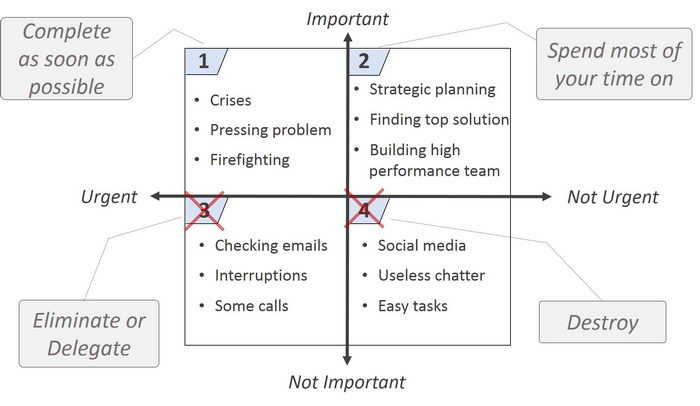
- Quadrant 1 - Urgent and important. These are the most pressing tasks such as unexpected fires and crises. They need to be tackled first. Constantly working on them leads to stress and burnout. That's how most people and teams operate day in - day out.
- Quadrant 2 - Not urgent and important. Strategic planning, finding the right products to launch and building a high-performance team are good examples. This is where most of your time should be spent on.
- Quadrant 3 - Urgent and not important. Urgent but not important: constantly checking emails, being distracted with minor things, making unnecessary phone calls, etc. The best thing it do is to either delegate or eliminate them all together.
- Quadrant 4 - Not urgent and not important. The main enemy of living a happy and successful life: social media, useless chatter, and easy tasks no one cares about. Destroy them immediately. If not ready to give up those "pleasures" reassess your life. Read our summaries on and The Top 5 Regrets Of The Dying to put things into perspective.
But how would this principle work in real life? On a day to day basis ?
Here is what you could do given that the 2-d quadrant is critical but the 1-st one is inevitable in most businesses, organisations, and families.
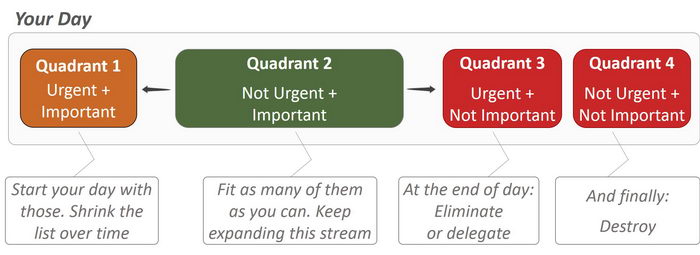
Split each day in 4 blocks:
- Start with quadrant 1 tasks and work on them tirelessly but don't spend the whole day unless absolutely necessary. Over time keep shrinking this pool of fires
- Switch to quadrant 2 tasks as soon as you can and spend the rest of the day on them
- Delegate or eliminate quadrant 3 tasks at the end of the day as quickly as possible
- Destroy quadrant 4 tasks by spending just a couple of minutes before finishing your work
The great news is that this matrix can be used for both projects and individual tasks. Take the time to filter all of them now and introduce this invaluable tool to your arsenal.
Habit 4 - Think Win-Win
The 4-th habit is designed to help us operate with the abundance mindset. Most people have the scarcity mentality believing that there is not enough resources out there for everyone: money, time, deals, opportunities, etc. Covey insists such mentality is dangerous.
Let's look at the people interaction mentality matrix to illustrate this point:
- Win - Win mentality - I win, you win. We both do. This is the ultimate state if you want to build meaningful relationships and get people to trust you while delivering results at the same time
- Lose - Lose mentality - When two stubborn win-win people get together they both lose. No one is willing to do anything. They simply curse each other after the interaction and part ways
- Win - Lose mentality - I win, you lose. Many people sit in this quadrant. All they care is how to achieve their own goals at the expense of others. Trust is broken. Relationships are hurt. No one likes to be "used"
- Lose - Win mentality - I lose, you win. Some people are too nice. They don't believe there is enough for everyone and therefore they are prepared to sacrifice their own interests to please others. While their masters are definitely happy to be on the win end of the deal, other people struggle as they don't get much attention at all. Relationships gradually deteriorate. Dramas unfold. And all of a sudden severe storms hit out of nowhere.
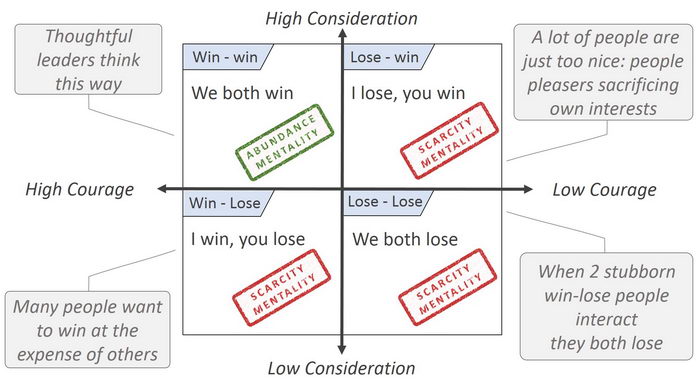
Develop the abundance mentality, become a WIN - WIN leader to help more people while achieving your own ambitious goals.
Habit 5 - Seek First To Understand Then To Be Understood
Before we can suggest solutions, offer advice, or otherwise express our views and opinions to other people we need to master the skill of listening actively.
Why?
Because no one cares about what you have to say until you genuinely demonstrate you care about what they have to say first. And that's the whole idea behind the fifth habit.
Imagine visiting a doctor. He shakes your hand firmly but doesn't offer to take a sit. Without asking a single question, the professional quickly scribbles a prescription and shouts loudly "Next !". You are escorted from the room promptly. The whole "experience" takes less than 30 seconds.
Would you ever visit this doctor again ?
The reality is that's how most people communicate. They are either extremely impatient and interrupt others immediately or they can't wait to start talking. They don't care what others have to say.
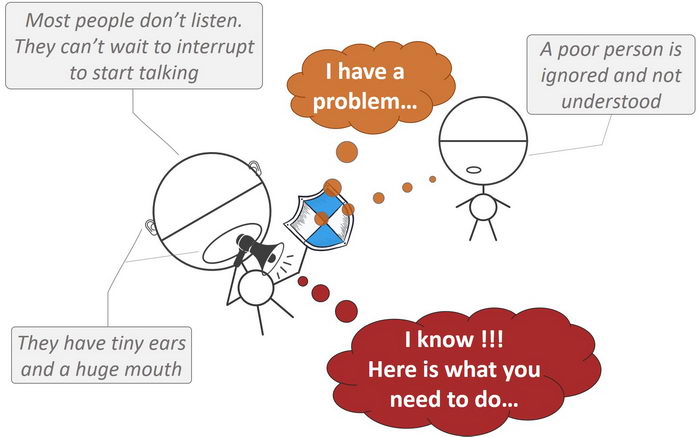
Unfortunately having a huge mouth and tiny ears is a common problem in the modern world of distractions and constant gratification.
But when we put the effort in developing the habit of listening actively and empathizing we reap huge benefits. When people are heard they open up immediately and they become grateful and loyal very fast.
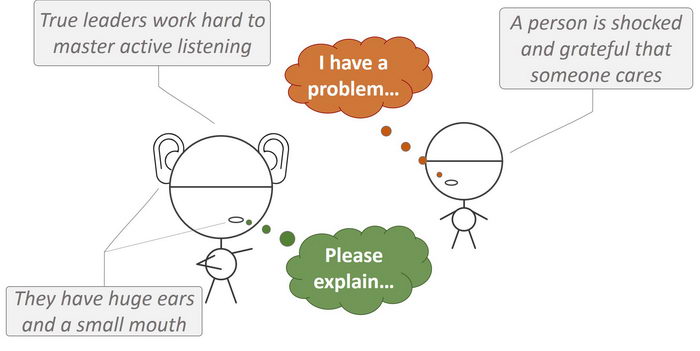
When you become a great listener you become a great influencer.
David Schwartz said it well in his book "The Magic Of Thinking Big": you don't get elevated from the top - it's the other way around. Those people who you help by taking the time to listen to and to understand propel you to extreme highs: be it a career, business, or personal life.
Habit 6 - Synergize
The first 5 habits combined prepare us for the sixth one, which is the habit of synergy - the Aristotle's theory that the whole is greater than the sum of its parts. Covey's idea is that when we work together collaboratively, we achieve much more than we could individually.

The challenge is to develop the habit of creatively combining multiple and diverse inputs into something bigger even when we disagree with some of them.
When we start valuing other people's ideas and opinions and are willing to look at problems from different perspectives unexpected things happen. The outcome often exceeds everyone's expectations.
Be curious, creative, and open minded. Just let it go and see what happens. You will soon discover that in many situations working together is way more effective than individually irrespective of individual weaknesses.
Habit 7 - Sharpen The Saw
To get to the peak of high performance and balanced living one must allocate time for renewing yourself physically, spiritually, mentally, and socially. You are the most important asset you have. Protect it with passion.
7.1 Physical
Exercising, eating healthy food, and getting enough sleep is the first step towards gaining total independence. Do everything you can to recharge your body at the physical level.
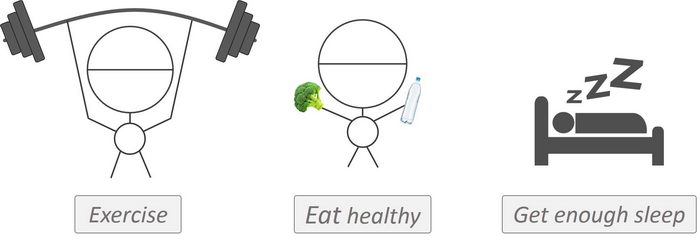
7.2 Spiritual
To recharge spiritually, Covey suggests finding inner peace and calmness: meditating, spending time in nature, and finding a hobby. In other words doing anything you can to calm your mind down and get distracted from the busy world as often as possible.
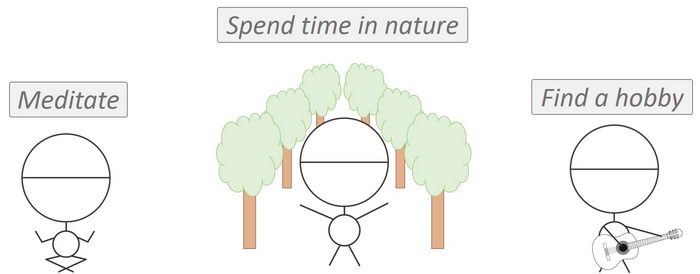
7.3 Mental
Another way to recharge is to refill your mental energy tank by disconnecting from the world of noisy technology and learning skills through reading. Major positive changes in life can only be built one small improvement at a time. As proven by multiple research studies reading only 10 minutes a day on a daily basis will make you an expert in any field in just 5 years.
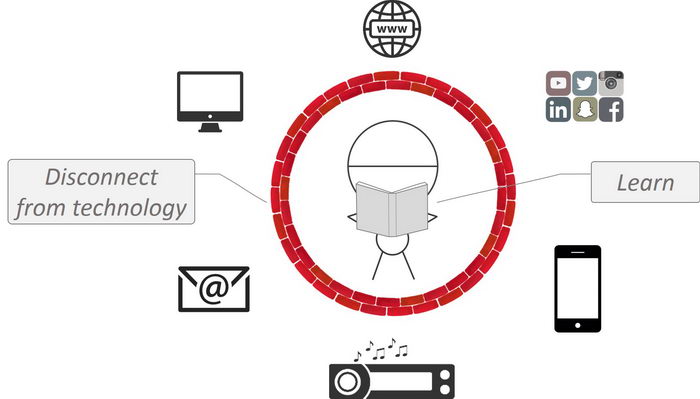
7.4 Social
To sharpen the saw socially means to build and develop meaningful relationships. Covey suggests silently helping other people without expectations in return. When this happens the rewards come back automatically. Think about how you can improve your family, your team, your friends. What can you do to help them and make them better and happier? Then just go do it, it will come multiplied in a number of different forms and shapes.
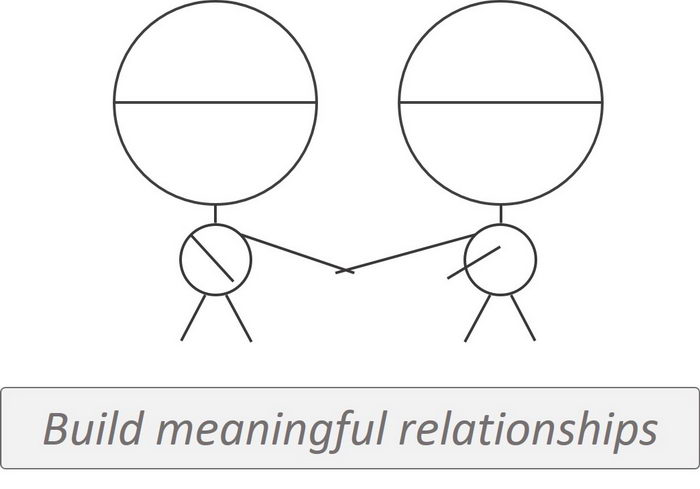
Sharpening the saw doesn't have to be the last step though. You can start working on this habit immediately even if the very first habit hasn't been developed yet. Remember you are the most important asset that you have. Keep protecting it daily to be constantly ready for challenges life throws at us all the time.
Subscribe For More
Love our reviews? Subscribe to never miss another one:
